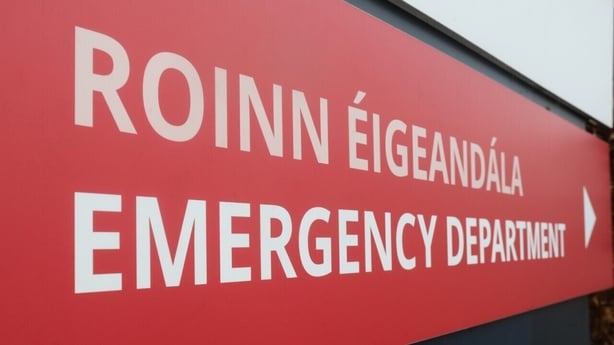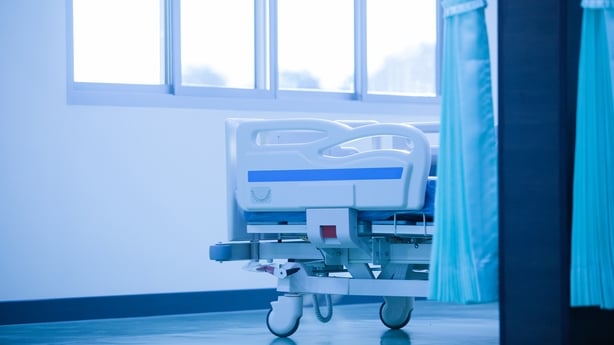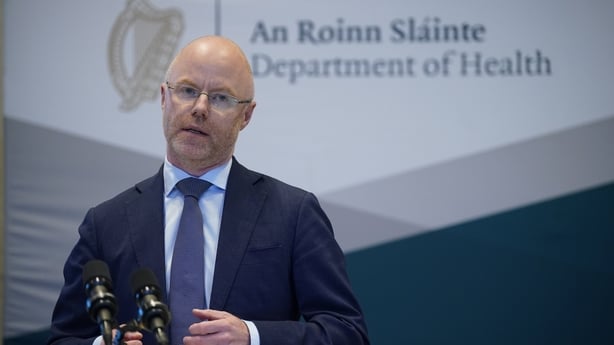Average waiting times for people needing admission to hospital from emergency departments have increased to 11.7 hours in Irish hospitals, according to new figures.
The Health Service Executive figures also show children waited an average of 13.3 hours and over 75s were waiting an average of 13.8 hours, during the first three months of this year.
The figures, which were released to Sinn Féin's health spokesperson David Cullinane, show the average waiting time for admission in the first quarter of this year was 11.7 hours compared to 11.6 for the same period last year and 10.2 in 2019.
The longest average waiting time was 22.8 hours at Tallaght hospital.
"This is unacceptable," Mr Cullinane said.
Speaking to RTÉ's Morning Ireland, he said: "These are people who end up in hospital trolleys and it has become almost normal that this happens every single day. It should not be normal.
"All of it is down to a lack of planning, a lack of investment, the fact that the Minister doesn't have a multiannual plan and the fact that we're playing catch up because of decisions of previous governments to take beds out of the system and not put the capacity in that we need."
Stephen McMahon, co-founder of the Irish Patients Association, said some people are waiting longer than the average 11.7 hours.
"We are talking about average times here, so you're going to find some people have spent maybe up to 24 hours and even more on a trolley waiting to get into a hospital bed," Mr McMahon said.
"There's a growing body of evidence that waiting times can have significant impact on clinical consequences for patients.
"Further remedial action should be taken to reduce these areas."
HSE CEO Bernard Gloster apologised for long waiting times.
In a statement, he said: "We can never step back from acknowledging and apologising to people who wait for long periods in our emergency departments, particularly those for whom a decision to admit has been made."
The figures show 93,308 hospital admissions from 351,000 emergency department attendances for the first three months of 2023.

The figures also show people aged over 75 had an average waiting time of 13.8 hours, with the highest waiting time in that age cohort being 27.4 hours at Cork University Hospital.
Last year, the longest average waiting time for over 75s was at the Mercy Hospital in Cork - 26.6 hours.
Waiting times for children increased from 7.5 hours in 2019 and 10.2 hours in 2022 and 13.3 hours for the first three months this year.
Some 3,746 children waited an average of over 13 hours out of 29,835 children who attended hospital in the first quarter of 2023.
Mr Cullinane said he is "concerned about the wait times for children".
He described the 13.3 hour average waiting time for children in the first quarter of this year as "absolutely unacceptable".
The figures also show that over 5% (17,769) patients waited longer that 24 hours for admission in the first quarter of this year.
Some 42.3% waited longer than six hours and 26.1% waited longer than nine hours.
Of 351,000 patients who attended emergency departments 24,456 patients left hospital early in the first quarter of 2023 compared to 25,676 in 2022 and 21,790 in 2019.

Mr Cullinane said this reflected a "real crisis in emergency departments".
"We're seeing the wait times get worse year on year, we have tens of thousands of patients who are leaving emergency departments without getting access to care," he said.
"So we obviously have a real crisis in emergency departments."
The HSE figures also show the number of bed days lost due to delayed discharges amounted to 50,588 for the first three months of this year.
This compares to 50,091 last year and 52,348 in 2019.
With the number remaining static over the years Mr Cullinane said the health service is not getting the best use out of beds it has in the system.
"I think a figure of 50,000 beds lost in the first quarter of this year is an exceptionally high figure," he said.
"The figures have remained static over the last number of years, but they're extremely high.
"This means we are not getting best use of the hospital beds that we have in the system and all of this is down to the fact that we don't have the recovery beds and the step down beds in the community."

He said he has called the HSE to purchase beds in private nursing home to alleviate the situation.
"I’ve said to the Minister for Health that in the very short term it would make sense if the HSE and the State were purchasing beds from private nursing homes to use for convalescence and recovery and for stepped down facilities," Mr Cullinane said.
"Some hospitals like University Hospital Waterford are doing that and is paying dividends and that's what they mean by looking at what's working in other areas, taking best practise and then mandating that across all hospitals.
"If we don't have stepped down and recovery beds in the community then what's happening is people are in hospital beds longer than they should through no fault of their own, and that then means they can't admit patients from emergency departments into hospitals on time.
"That shows so many things going wrong at the same time because we don't have the capacity in the hospital.
"On the one hand, but we also don't have capacity in the community in terms of step down and recovery beds."
Mr Cullinane added that Sinn Féin will move a private members' motion in the Dáil calling on the Government to legislate for mandatory safe staffing levels in hospitals and provide a five and 10-year health service capacity roadmap, among other points.

HSE says addressing issues
The HSE said in a statement that "unacceptably long waiting times for many our emergency departments" are happening as there is a "consistent and substantial increase in the numbers of people attending EDs and being admitted to hospital in recent years".
"In the last week alone, it had 28,739 people attend ED - an increase of 12.8% over the same week in 2019," a spokesperson said.
"Up to the week ending on 14 May, the number of patients aged over 75 attending EDs rose by 17.9% over the same period in 2019, and the number of patients admitted via EDs rose by 11%.
"It is in this context that we are continuing to see unacceptably long waiting times for many our emergency departments.
"These times are influenced by the volume of patients presenting to the emergency department and the requirement to prioritise, treat and care for the sickest and older cohort of patients."
The HSE said it is addressing the issue through "continuous improvement plans" and is now "taking an all-year round approach to managing urgent care and emergency departments".
The HSE will finalise a plan for the remainder of 2023 later this month.
"We will also use this to develop a medium-term plan for the next three years with our focus on the total healthcare system all year round," the spokesperson added.
On bed blocking and delays in transferring or discharging people from hospital, the HSE said "significant steps are being taken to reduce this phenomenon at least to the extent of the length of time people are delayed in going to their onward care".
Mr Gloster said: "Delayed transfers of care exceed the number of people on trolleys most days and that has to be our focus.
"Delays are compounded by the on-call nature of many of our services at weekends. The evidence is clear we have to do better on both of these points and that is where our concerted effort will be until there is improvement."
We need your consent to load this rte-player contentWe use rte-player to manage extra content that can set cookies on your device and collect data about your activity. Please review their details and accept them to load the content.Manage Preferences
Tallaght
A statement from Tallaght University Hospital said it had seen "an increase in presentations of over 75-year-olds" and that the "hospital works continuously to provide timely access to beds for admitted patients in ED".
"The hospital regrets the extended wait times that some patients experience while awaiting treatment through the ED, however priority is given at all times to those requiring the most urgent medical care," the statement added.
Cork
A statement from Cork University Hospital said it has been experiencing unprecedented levels of demand for services which currently exceed the hospital’s capacity.
The situation is compounded by long standing issues with capacity which the hospital is working with the HSE to resolve.
"Regrettably while patients presenting at CUH are experiencing long delays, urgent patients are always prioritised for treatment and care," the CUH said.
"In order to balance risk across the hospital and system, patients have on occasions been cared for in corridors or in ward areas for a short period with close monitoring and on-going risk assessments."

Department of Health
A Department of Health statement said Minister Stephen Donnelly "accepts that extended waiting times for hospital admissions for sick patients are unacceptable" and that a huge amount has been done to increase capacity in health service "by funding an unprecedented increase in staff and beds".
"Since the start of 2020 we now have 20,000 more staff in the Health Service Executive – including 6,300 nurses and midwives, 2,000 doctors and dentists and 3,200 health and social care professionals," the Department of Health said.
"We also have increased the number of beds by 1,000.
"The HSE Winter Plan for 2022-23 supported acute and community services this winter to respond to high levels of emergency attendances and admissions across the acute sector, long waiting times in emergency departments and high occupancy rates across acute hospital settings.
"The plan was estimated at €169 million".
According to the statement the "Minister for Health, the Department of Health and the HSE are developing a multi-annual urgent and emergency care improvement plan to deliver a structured, co-ordinated, and collaborative framework to enable high impact operational improvements.
"The improvement programme will deliver sustainable improvements to unscheduled care, most of which currently occurs in the ED.
"A key priority of the Department is the improvement of Patient Experience Times, the time from a patient’s registration in the ED until they are either admitted to an inpatient bed or discharged from the ED.
"An initial focus of the programme will be on improving PET for the over-75s as a priority patient cohort and the most likely to require longer hospital stays. Reform of service delivery across the entire health system is a key part of achieving this."
The department said it is also focused on reducing delayed transfers of care.
Allowing patients to move home or to an alternative suitable community setting which meets their needs is a key priority.
"There were 9,472 approvals for transitional care during 2022 with a further 1,308 extensions approved," the Department said.
"Between 1 January and 12 May 2023 there have been 4,372 transitional care approvals and a further 558 extensions approved."
It added, there are 697 private contracted beds on stream in nursing homes across the country with a focus on providing short stay residential beds with additional therapy and support services.
These provide a reablement service and can also be accessed by the community as a hospital avoidance measure in addition to assisting with hospital discharges.
In addition, there are 410 public intermediate care beds supporting patients who no longer require acute care and need step down support.
'No dignity'
A mother, whose daughter came to the emergency department of University Hospital Limerick with suspected appendicitis, said the long wait to be admitted was terrifying and daunting.
Tricia Delaney said it took 15 hours for her daughter, who is in her 20s, to be admitted to hospital to a trolley outside a ward, after which she underwent an appendectomy
Ms Delaney said it was terrifying for her daughter because there were other people in the ED who she said were intoxicated.
She added that there is no dignity for patients ending up on a trolley after 15 hours of waiting to be admitted.
The HSE said in a statement: "For patient confidentiality reasons we cannot comment on individual cases, but we do recognise the challenges, discomfort and real distress for patients and the public when emergency departments are under pressure.
"We sincerely regret the delays for patients and the pressures on healthcare staff.
"Concrete plans are being put in place to directly address these pressures, including year round planning, followed by a medium term plan for the next three years and the integration of our community and acute hospital services."







